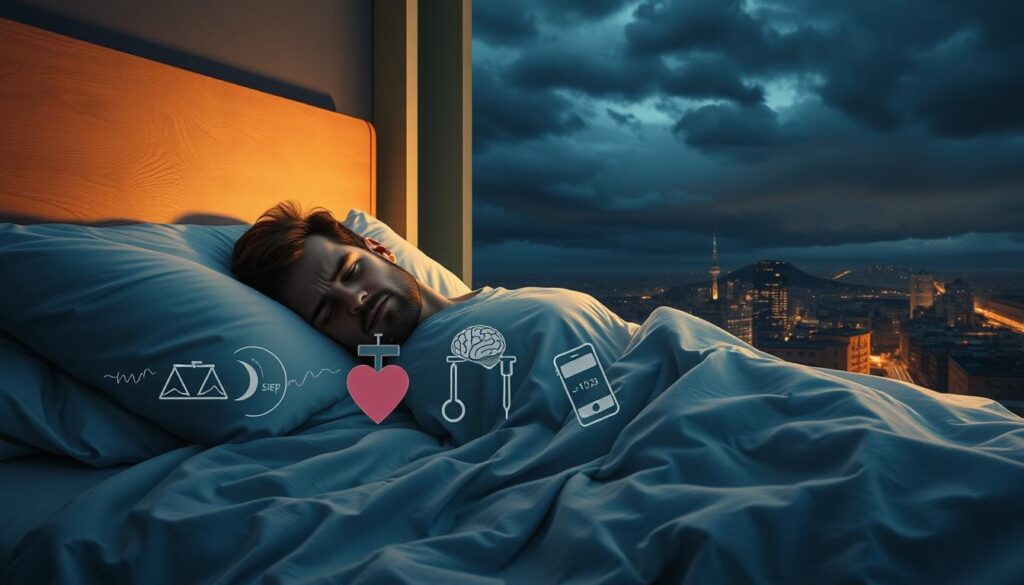Did you know that skimping on sleep could be sabotaging your fitness goals? Research shows a strong link between sleep deprivation and weight gain.
According to the CDC adults who sleep six hours or less tend to have a higher BMI. This isn’t just about feeling tired it’s about how your body functions.
When you don’t get enough rest, your hormones go haywire. Ghrelin the hunger hormone, increases while leptin which signals fullness, decreases.
This imbalance can lead to consuming up to 500 extra calories a day. Add in reduced physical activity due to fatigue and it’s easy to see why sleep is crucial for maintaining a healthy weight.
Studies also connect poor sleep to a higher risk of obesity and metabolic issues. So if you’re struggling to shed pounds, it might be time to prioritize your rest. Let’s dive deeper into how sleep affects your body and what you can do about it.
Key Takeaways
- Sleeping six hours or less is linked to a higher BMI.
- Sleep deprivation disrupts hunger hormones like ghrelin and leptin.
- Short sleepers consume up to 500 extra calories daily.
- Fatigue from poor sleep reduces physical activity.
- Insufficient rest increases the risk of obesity and metabolic syndrome.
Introduction The Overlooked Role of Sleep in Weight Loss
Sleep is often the missing piece in the weight management puzzle. While most adults focus on diet and exercise the importance of getting enough sleep is frequently ignored. Yet, research shows that sleep affects your body in ways that directly impact your health and fitness goals.
When you don’t prioritize rest, your body struggles to regulate blood sugar levels. This can lead to poor food choices and increased cravings.
Many adults turn to caffeine to compensate for sleep debt, but this only masks the problem. A 2019 study found that just one hour of sleep inconsistency increases the risk of metabolic disorders by 27%.
Sleep and metabolism share a bidirectional relationship. Poor rest slows down your metabolic rate, making it harder to burn calories. At the same time metabolic issues can disrupt your sleep patterns. This creates a cycle that’s tough to break without addressing both factors.
Later sections will explore how hormonal mechanisms like ghrelin and leptin are influenced by sleep. For now remember that prioritizing rest is a key step toward achieving your health goals. Sleep isn’t just about feeling refreshed it’s about giving your body the support it needs to function optimally.
The Science Behind Sleep and Weight Loss
Understanding the biological mechanisms behind sleep can shed light on its role in weight management. Your body relies on rest to regulate essential processes including hormone production and metabolic function. When these systems are disrupted it can lead to significant challenges in maintaining a healthy weight.

How Sleep Affects Hormones
Sleep plays a critical role in balancing hormones that control hunger and fullness. Leptin, the hormone that signals satiety decreases by 23% in individuals who are sleep deprived. At the same time ghrelin levels which stimulate appetite rise by 15%. This imbalance can lead to overeating and poor food choices.
Additionally, poor rest disrupts the production of human growth hormone HGH which is essential for fat metabolism. GLP-1 another hormone that regulates appetite becomes less efficient without adequate sleep. These hormonal shifts create a perfect storm for weight gain.
Sleep and Metabolism
Your metabolic rate is closely tied to your sleep patterns. Inconsistent rest can increase insulin resistance by 2.5 times raising the risk of type 2 diabetes. Cortisol the stress hormone also spikes by 37% during REM sleep loss leading to late-night cravings and fat storage.
Circadian rhythm disruption further complicates matters by impairing fat oxidation. A 2019 study involving 2,003 adults found that irregular sleep patterns significantly increase metabolic risks. Prioritizing rest is essential for maintaining a healthy metabolism and achieving your fitness goals.
How Lack of Sleep Hinders Weight Loss Efforts
The connection between insufficient rest and health challenges is more profound than many realize. Research shows that individuals who get fewer hours of rest face a 123% higher risk of obesity. This is especially true for those who consistently sleep less than six hours per night.
One of the most immediate effects of being sleep deprived is the surge in junk food cravings. After just four nights of inadequate rest, cravings for unhealthy snacks increase by 57%. This makes it harder to stick to a balanced diet and avoid weight gain.
Metabolic slowdown is another critical factor. Resting energy expenditure drops by 5-20% in individuals with poor sleep. This reduction makes it harder to burn calories even during periods of inactivity. Additionally insulin sensitivity decreases creating a state comparable to prediabetes.
Deep sleep stages are essential for muscle repair and growth. When these stages are disrupted human growth hormone HGH production is suppressed. This leads to muscle loss and further complicates weight management efforts.
Chronic sleep deprivation not only affects your energy levels but also your body’s ability to process glucose efficiently.
Sleep phase disruptions particularly in the N1 stage, impair glucose processing. This can lead to higher blood sugar levels and increased fat storage. The prefrontal cortex responsible for decision-making, is also compromised. This makes it harder to resist unhealthy food choices.
| Effect | Impact |
|---|---|
| Metabolic Slowdown | 5-20% reduction in resting energy expenditure |
| Insulin Sensitivity | Drops comparable to prediabetic states |
| Muscle Loss | HGH suppression during deep sleep stages |
| Glucose Processing | Impaired due to N1 sleep phase disruptions |
Understanding these effects highlights the importance of prioritizing rest. Addressing sleep issues can significantly improve your body’s ability to manage weight and maintain overall health.
The Impact of Sleep Deprivation on Food Choices
Ever wonder why you crave pizza after a sleepless night? Research shows that sleep deprivation significantly alters your brain’s response to food. fMRI studies reveal a 300% greater brain reaction to pizza ads when you’re tired. This heightened sensitivity makes unhealthy options harder to resist.

When you’re sleep-deprived, your body’s endocannabinoid system activates, increasing cravings for fatty and sugary foods. This effect is often compared to the munchies experienced after consuming marijuana. Your brain’s reward centers light up making junk food feel irresistible.
Your appetite hormones also play a role. Ghrelin, which stimulates hunger rises while leptin the hormone that signals fullness drops. This imbalance can lead to overeating and poor food choices. Studies show that tired individuals consume 11% larger portion sizes compared to well rested peers.
Cravings and Junk Food
Sleep loss reduces the prefrontal cortex’s control over impulses. This makes it harder to resist unhealthy snacks, even when you know they’re bad for you. The result? A cycle of cravings and indulgence that can derail your health goals.
Late-Night Snacking
Late night snacking is another common issue. USDA data shows that 73% of these snacks exceed 600 calories. To avoid this experts recommend stopping food intake at least three hours before bed. This helps maintain stable blood sugar levels and supports better sleep quality.
If you must snack, opt for protein rich alternatives like Greek yogurt or nuts. These options are more satisfying and less likely to spike your blood sugar. By making smarter choices you can curb cravings and support your health.
Sleep deprivation doesn’t just make you tired it rewires your brain to crave unhealthy foods.
Understanding these effects can help you take control of your diet. Prioritizing rest isn’t just about feeling refreshed it’s about giving your body the tools it needs to make healthier choices.
Sleep and Physical Activity
Your physical activity levels are deeply tied to the quality of your rest. Without adequate sleep your body struggles to maintain the energy needed for exercise and recovery. This can lead to reduced performance and slower progress toward your fitness goals.
Research shows that poor rest can reduce workout duration by 22%. Sleep-deprived athletes also experience slower reaction times, with delays of up to 0.5 seconds. These effects highlight the importance of prioritizing rest for optimal physical activity.
Energy Levels and Exercise
Sleep plays a critical role in maintaining energy levels. When you’re well-rested, your body can efficiently convert glycogen into fuel for exercise. However, sleep restriction impairs glycogen storage, reducing endurance and stamina.
Studies show that VO2 max decreases by 3-5% after 72 hours of sleep restriction. This drop in aerobic capacity makes it harder to sustain high-intensity workouts. For athletes this can mean slower times and reduced performance.
Impact on Athletic Performance
Athletic performance is closely linked to sleep quality. NBA players who slept nine hours improved their free throw accuracy by 9%. This demonstrates how rest enhances motor skill consolidation and precision.
REM sleep is particularly important for recovery. It helps the brain process and retain new skills making it essential for athletes. For those struggling with sleep, power naps can provide a temporary boost in energy and focus.
Sleep is the foundation of athletic performance. Without it even the most dedicated athletes will struggle to reach their full potential.
- Strength athletes benefit from 7-9 hours of sleep for muscle repair.
- Cardio athletes may require up to 10 hours for optimal recovery.
- Power naps of 20-30 minutes can improve alertness and performance.
Health Risks Associated with Poor Sleep
Chronic sleep issues can lead to serious health complications, far beyond just feeling tired. From physical conditions like obesity and type 2 diabetes to mental health challenges, the effects of inadequate rest are profound. Understanding these risks can help you take proactive steps to protect your well-being.

Obesity and Type 2 Diabetes
Poor sleep is a significant contributor to obesity. Cortisol dysregulation, often caused by sleep deprivation leads to visceral fat accumulation. This type of fat is particularly harmful as it surrounds vital organs and increases the risk of metabolic disorders.
Additionally TNF alpha inflammation triggered by poor rest, blocks leptin receptors. This disrupts hunger signals, leading to overeating and weight gain. Sleep apnea patients, for example, have a four times higher incidence of type 2 diabetes compared to those who sleep well.
Mental Health and Stress
Sleep fragmentation activates the hypothalamic-pituitary-adrenal axis, increasing stress levels. This can lead to chronic anxiety and depression. In fact, 89% of chronic insomniacs report higher antidepressant use.
Bipolar disorder relapse rates are also closely tied to irregular sleep patterns. Nocturnal blood pressure spikes in short sleepers further exacerbate these issues creating a cycle of poor mental and physical health.
Sleep is not just a luxury it’s a necessity for maintaining both physical and mental health.
- Visceral fat accumulates due to cortisol dysregulation.
- TNF-alpha inflammation blocks leptin receptors, increasing hunger.
- Sleep fragmentation activates the hypothalamic-pituitary-adrenal axis.
- Bipolar disorder relapse rates are linked to irregular sleep patterns.
- Short sleepers experience nocturnal blood pressure spikes.
- NIH study: Six-hour sleepers have four times higher burnout rates.
Expert Tips for Improving Sleep Quality
Improving your sleep habits can transform your overall well-being and support your health goals. Small changes to your routine and environment can make a big difference in achieving good sleep. Let’s explore practical strategies to enhance your rest.
Creating a Sleep-Friendly Environment
Your bedroom setup plays a crucial role in promoting restful sleep. The National Sleep Foundation recommends keeping your room at 66°F for optimal comfort. Use blackout curtains to block external light and consider a weighted blanket 15% of your body weight is ideal for reducing anxiety.
Smart bulbs that mimic sunset hues can help regulate your circadian rhythm. Blue light blockers especially those in the 400-450nm range, can boost melatonin production by 58%. These adjustments create a calming atmosphere for better sleep.
Establishing a Bedtime Routine
A consistent bedtime routine signals your body that it’s time to wind down. Try the military-developed 2-minute sleep breathing technique: inhale for 4 seconds, hold for 7 seconds, and exhale for 8 seconds. This method can help you fall asleep faster.
Progressive muscle relaxation is another effective strategy. Start by tensing and relaxing each muscle group, beginning with your toes and working up to your head. Pair this with the 10-3-2-1-0 rule: no caffeine 10 hours before bed, no meals 3 hours prior, and no screens 1 hour before sleep.
A well structured bedtime routine is the foundation of quality sleep and improved health.
- Set a caffeine cutoff time based on your CYP1A2 gene variants.
- Use a smart bulb schedule to mimic natural light changes.
- Practice progressive muscle relaxation for deeper rest.
Conclusion Prioritizing Sleep for Successful Weight Loss
Achieving your health goals starts with prioritizing sleep. Studies show that getting enough sleep can lead to a 17% greater fat loss compared to shorter rest periods. It also improves diet adherence by 31%, making it easier to stick to healthy habits.
To optimize your rest, follow a four-phase approach: Assess your current habits Optimize your sleep environment, Monitor your progress, and Adjust as needed. This structured method ensures long-term success.
Sleep acts as a multiplier for other weight loss efforts. When combined with a Mediterranean diet, it offers synergistic benefits for both health and well-being. Over time, prioritizing rest can also reduce cardiovascular risks significantly.
Ready to take the first step? Download a sleep cycle analysis app to track your progress and start your 30-day sleep challenge today. Your body will thank you.





